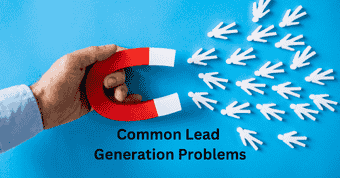Lead generation is important for business growth, but many services fall short. By understanding these challenges, businesses can improve their strategies and see better results.
1. Unclear Targeting and Strategy
Without a clear plan or a well-defined audience, lead generation efforts may attract unqualified leads, wasting resources.
2. Poor Quality of Leads
Focusing on the number of leads rather than their quality results in low-intent prospects that are unlikely to convert.
3. Ineffective Communication
Misunderstandings and lack of consistent communication between agencies and clients can create frustration and unmet expectations.
4. Inadequate Reporting and Analytics
Without clear data, it’s tough to measure success or adjust strategies, making it hard to improve lead generation efforts.
5. Failure to Integrate with Sales Team
When lead generation services don’t align with the sales team, opportunities can be missed, leading to lower conversion rates.
6. Overpromising and Underperforming
Setting unrealistic expectations can damage relationships and erode trust when results don’t meet promises.
7. Lack of Industry Expertise
If agencies don’t understand your specific industry, their strategies may miss the mark, leading to ineffective campaigns.
8. Ignoring Multi-Channel Strategies
Relying on one marketing channel reduces reach and limits results. A multi-channel approach helps to maximize engagement and effectiveness.
9. Not Defining Ideal Customer Profile (ICP)
Without a clear ICP, your lead generation efforts might attract the wrong prospects, leading to wasted time and low conversion rates.
10. Overlooking Lead Nurturing
Many leads require time and follow-up before they’re ready to buy. Ignoring this step can result in lost opportunities.
11. Not Using Automation
Automation tools help streamline lead follow-ups and nurture campaigns. Without them, businesses miss out on timely engagements.
12. Insufficient Data Analysis
Without in-depth data analysis, businesses may make decisions based on assumptions, which can lead to poor performance.
13. Poor Follow-Up
Slow or ineffective follow-ups can cause potential customers to lose interest or choose competitors.
14. Underutilized Customer Referrals
Failing to encourage referrals can hinder organic lead growth, leaving businesses overly reliant on paid marketing.
15. Lack of a Clear Value Proposition
If customers don’t understand what makes your product or service unique, they might overlook your offering.
16. No Tracking and Measurement
Without tracking lead generation performance, it’s difficult to figure out what’s working and what needs improvement.
17. Lack of Resources
Limited staff, budget, or time can lead to ineffective lead generation, impacting overall business success.
18. Inadequate Lead Qualification
If leads aren’t properly qualified, sales teams may waste time on prospects who aren’t ready to make a purchase.
19. Failure to Adapt to Market Changes
Keeping up with changing trends and consumer behaviors is important. Sticking to outdated strategies can hurt your lead generation efforts.
20. Overlooking Mobile Optimization
Since many users access content on mobile devices, not optimizing your lead generation efforts for mobile can result in missed opportunities.







